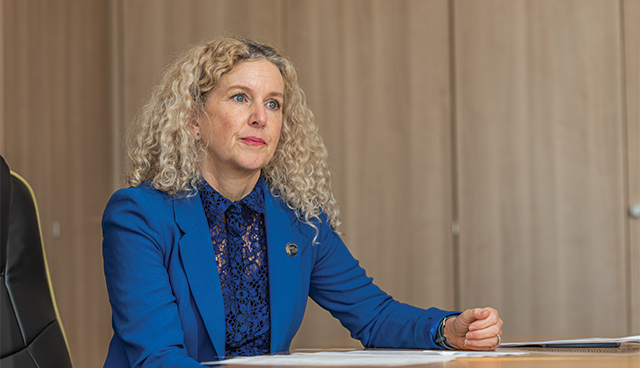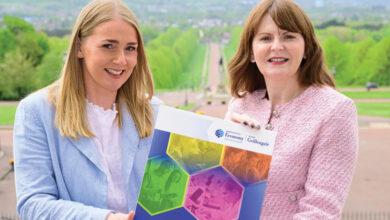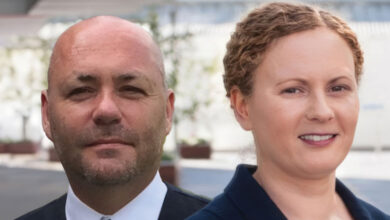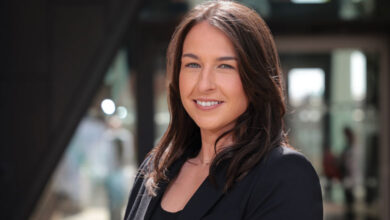Delivering skills for a future economy

Principal and Chief Executive of Belfast Metropolitan College, Louise Warde Hunter, discusses the critical role of the higher and further education institution’s role in delivering the future skills needed for Northern Ireland’s economic recovery.
Taking up the role as head of Northern Ireland’s largest and longest established further and higher education college in Northern Ireland in April 2020, Warde Hunter expresses her admiration for an organisation which had already swung into action in transitioning to deliver for its students amidst the pandemic.
In mid-March 2020 Belfast Met suspended the majority of face-to-face delivery and closed its four campuses, making radical changes in a short space of time, which the Chief Executive describes as a demonstration of “our unwavering commitment” to ensuring student success.
While the College was still very much open for business, Belfast Met’s delivery model was disrupted; major changes were required including a move to virtual delivery for over 12,000 students and a move to remote working arrangements for the majority of the College’s 1,000 staff.
“The speed at which our lecturing staff moved from face-to-face learning to remote delivery methods has been remarkable, flipping a classroom-based approach to an online model seemingly overnight. That switch required the support and efforts of colleagues, including those not on the frontline interface with our students,” explains Warde Hunter. “Getting the right balance was critically important in ensuring we met the distinctively different needs of our students, including those learners with special needs, while also addressing pre-existing but now more pronounced societal challenges, such as digital disadvantage. In doing so we’ve had to be innovative and ensure that we stay relevant to the people who need us.”
The Chief Executive has also had to adapt her approach to how she envisaged her early days in the role. Having originally scoped an engagement plan that involved a range of face-to-face meetings across the College’s structures, Warde Hunter has had to be innovative in her approach in getting to know her team and students, while also affording them the opportunity to meet her, including online ‘Ask Me Anythings’, virtual meetings and delivering weekly vlogs.
An experienced senior civil servant, Warde Hunter was most recently Deputy Secretary as Head of Housing, Urban Regeneration and Local Government at Department for Communities and has had senior roles delivering policy in a range of areas including education, agriculture, environment and justice. Outside of the Civil Service, Warde Hunter was Scotland and Northern Ireland Strategic Director for Children’s Services in the large UK charity Action for Children and Chief Executive of Common Purpose Ireland.
Outlining her reasoning for taking up the post, she states: “Belfast Met has a distinct identity as the further education (FE) college for the capital of Northern Ireland, responding to the opportunities afforded by growth, jobs and diversity alongside dealing with the challenges of areas with some of the highest levels of poverty, economic inactivity and deep-rooted social problems.
“Coming from the Department for Communities, I am critically aware of the positive impact that a job has on families and communities. It offers confidence, a sense of purpose, a sense of pride, of personal responsibility and standing. Belfast Met provides the wraparound to give people the skills to get a job and the confidence to believe in themselves.
“The College plays a leading role in the skills system for Northern Ireland, providing education, technical and professional skills at all levels to learners from all socio-economic backgrounds.”
Interestingly, Warde Hunter’s post-graduate study thesis focused on leadership in the public sector at a time of change, work that she has revisited while delivering a future pathway for Belfast Met.
Leadership
The importance of leadership in a time of change was highlighted again in September 2020 when the College
re-opened its buildings to welcome new and existing further and higher education learners, which the Principal says required an act of “reimagining the physical space coupled with continuous communications to give confidence that all steps had been taken” to ensure safe movement.
“The start of the 2020 2021 academic year was very different from any previous year. We have worked to reimagine our college with many of our familiar processes reconfigured,” she states.
Guided by PHA advice, the College was forced to revert again to campus closures during the recent period of restrictions but has established a plan for education delivery going forward which includes three models of teaching in the form of face-to-face, which is the traditional in-college delivery following social distancing rules; blended learning, whereby both the face-to-face and remote delivery coexist; and relayed learning, where students will rotate between synchronised in-class and digital delivery of lectures.
As well as teaching methods, Belfast Met has also been quick to adapt its student support services, which Warde Hunter highlights operates under the aim of providing “outstanding service, effecting positive change through learner enhancement, achievement and progression in an all-inclusive environment”.
“Belfast Met is committed to excellence in every way and at the forefront of this is looking after the best interests of our students. We want students to gain not only an excellent education but an excellent educational experience,” the Chief Executive says.
Belfast Met’s student support team switched to remote support in March to continue the delivery of services which range across college life from a careers and employability service through to funding advice, student wellbeing and counselling, recognising the variety of needs of the colleges diverse learners.
Economic recovery
While much of the initial focus for the College and indeed for wider society was on managing the pandemic’s early impact, recognition of the need for economic recovery and growth, which also pre-dated the pandemic, has become a central focus.
It is in this area where Warde Hunter believes that Belfast Met has a pivotal role in ensuring the delivery of skills for a workforce of the future through their core programmes from essential skills through to higher level apprenticeships and degrees.
As well as the September intake, the College will also be offering a range of courses starting in January 2020 across a range of subjects.
“The College has a dual mandate of economic development and social inclusion. Belfast Met’s goal is to assist learners to develop the knowledge and skills needed for the workplace and/or further study and thereby support them to progress through education and training to get a job, keep a job or get a better job,” explains Warde Hunter.
The economic detriment and rising levels of unemployment and labour market inactivity predicted from the outset of the introduction of restrictions, are already manifesting, meaning that Belfast Met’s offering to skill and reskill for a changing labour market has never been more important.
Even prior to the pandemic, the College’s corporate plan, entitled Leading the City to Work, set out the ambition to address the gaps identified by the Northern Ireland Skills Barometer, which outlines a significant shortfall in skills at NQF Level 4 and Level 5, and Warde Hunter says that the plan will be “critical to the economic recovery” of Northern Ireland following Covid-19.
“Getting the right balance was critically important in ensuring we met the distinctively different needs of our students, including those learners with special needs, while also addressing pre-existing but now more pronounced societal challenges, such as digital disadvantage.”
“Belfast Met’s activities help to deliver on the goals and ambitions of the Programme for Government and the draft Industrial Strategy through a large range of education and training provision in priority skills sectors,” states the Chief Executive. “We are continuing to work with employers remotely to reskill and upskill their workforce, particularly through a wide range of fully-funded part time courses, helping them to deal with the challenges that lie ahead.”
Belfast Met is the lead college in the Belfast Region City Deal, which was formally announced in February 2019. The City Deal has seen the College lead on the development of a region-wide skills and employability framework linked to the £850 million capital investment programme. The City Deal is projected to create some 20,000 new jobs by 2030 and Belfast Met leads the cross-sectoral working group in partnership with the local councils, developing an action plan which the Chief Executive explains will include the roll out of new employability programmes for the economically inactive, youth engagement, hospitality, digital skills and upskilling for SMEs.
Additionally, the College is the designated curriculum hub for the areas of digital ICT and hospitality and tourism. Explaining the purpose of the hubs, Warde Hunter says: “The aim of the hubs is to enhance existing capability within the six colleges in Northern Ireland to ensure excellence in the delivery of industry-validated curriculum, staff and sector continuous professional development, economic engagement, stakeholder engagement and future scoping.”
Belfast Met’s expertise in skills development is a valued asset as the Department for the Economy (DfE) develops a future Skills Strategy for Northern Ireland. Warde Hunter explains that as part of the College’s mandate to assist businesses to innovate and grow, thereby increasing competitiveness across the region, the College is building on the Employer Survey 2020 which it conducted on behalf of the DfE and other colleges, which provides insights into working with employers that are not engaged with further education colleges.
“The great saying ‘what got us to here won’t get us to there’ comes to mind. That doesn’t mean that we ignore the successes of the past but that there is a recognition that innovation will be required of all of us. Giving evidence to the Northern Ireland Assembly’s Economy Committee in 2020 I stressed the importance of valuing the further education sector’s contribution to the education and skills community and our wider economy.
“The development of a new Skills Strategy is exciting and will offer an umbrella for so much of what the further education sector does. Our proximity to employers and our place embedded in the community will really make the difference needed.”
Partnerships
Setting out the importance of Belfast Met’s existing and extensive partnership network, which ranges from small and big employers through to community groups, schools and universities, Warde Hunter points to the delivery of a number of DfE-funded Covid-19 responsive programmes, which include online courses for high-demand areas such as childcare, building information modelling and IT. Additionally, the Department has announced a significant package of over £17 million for employers to bolster the apprenticeships system. The Chief Executive says that, coupled with a new Skills Strategy, the provision of valuable employment for young people and the strengthening of a skills pipeline for employers will “signal the parity of esteem between a professional vocational route to employment and an academic one”.
Looking beyond Covid, Warde Hunter points to the existing delivery of a range of skills programmes to offer bespoke accredited and non-accredited training, helping to improve competitiveness of our business community. Additionally, the College supports various programmes financed by DfE and Invest NI which help businesses embrace innovation.
“The College plays a leading role in the skills system for Northern Ireland, providing education, technical and professional skills at all levels to learners from all socio-economic backgrounds.”
“The College has led on the national award-winning Assured Skills Programme for several years, securing employment for over 1,000 graduates,” explains Warde Hunter. “Belfast Met is also leading the way in working with businesses to access research funding. Belfast Met has supported the development of the International Education Strategy for Northern Ireland working with InvestNI which has helped the further education sector to develop a pipeline of opportunities to connect us to international markets. The College has been a leading member of the UK Skills Partnership established by the Department for International Trade to developing international opportunities to sell UK education and skills experience overseas.
“The online provision, mentoring and bespoke offerings of Belfast Met will be essential to meeting the needs of the business community, learners in employment and those returning to employment in the drive to revive the economy,” the Chief Executive adds.
Turning to her long-term vision for Belfast Met, Warde Hunter articulates clearly the drive towards three overlapping ambitions for Belfast Met to be: the college of choice, meaning that young people and learners of all ages recognise the quality of education and qualification they will receive to lead them on their chosen pathway; the employer of choice, meaning that Belfast Met is recognised as a great place of work with the ability to recruit, retain and develop talent; and the partner of choice, making Belfast Met a thought leader in the further education and skills sector, particularly on the themes of sustainability and digital.
“I think those core ambitions will guide us over the next decade and I want Belfast Met to be a major part of changing the understanding around the contribution further education can make to the recovery and growth of Northern Ireland,” she concludes.
Profile: Louise Warde Hunter
Born in Belfast, Louise Warde Hunter originally began her career in London before returning to Northern Ireland in 1992 as founder and Chief Executive of Common Purpose (Ireland), a leadership development organisation. She joined the Northern Ireland Civil Service in 2004 as Director of Families and Communities in the Department of Education.
In 2009, Louise took a career break to take up the post as Strategic Director Children’s Services for the charity Action for Children, a position she held for almost three years. In 2012 she returned to the public sector as Director of the Department of Environment before being appointed as Head of Policing Policy and Strategy in the Department of Justice later that year. In 2014, Louise was appointed Deputy Secretary and Director of Policy in the Department of Agriculture and Rural Development. From 2017, Louise was Head of Housing, Urban Regeneration and Local Government at Department for Communities and Gender Champion for NICS. Louise took up the role as Principal and CEO of Belfast Met in April 2020.
Outside work, Louise is an active runner, completing her first marathon last year, having taken up the sport later in life. However, she admits to missing her loves of live music and theatre due to the restrictions.






